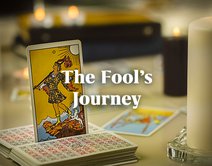TL;DR
The concept of The Fool’s Journey in Tarot teaches us about the natural progression of life in this world. Starting from the Fool card and ending with the World card, each card represents a different stage of life and presents the various joys and challenges that each of these stages brings. Learn how The Fool’s Journey can teach and guide you on your own life’s journey.The Concept of the Fool’s Journey

The order of the 22 Major Arcana cards represents the journey of life referred to as ‘The Fool’s Journey’. The thought concept sees the Fool, the first card of the Major Arcana, depicted as a newborn baby yet to experience the many different challenges, joys and lessons of life. Then, as the Fool embarks on his journey, each card of the Major Arcana presents a new lesson and stage of personal growth. The final stage, The World card, symbolizes the accumulation of knowledge and experience gained by the Fool throughout his eclectic journey. By the end, the Fool is anything but a fool, instead symbolizing a person who has reached full maturity by overcoming all of the adversities presented by the universe.
0 - The Fool: Birth
The Fool card is a card of new beginnings. At the very beginning of the journey, the Fool is a newborn; fresh, spontaneous and impressionable. At this point, he is unaware of the difficulties he is yet to face in life. In the classic Rider Waite deck, the Fool is depicted as a young man absentmindedly stepping off a cliff into the unknown. Zero is an interesting number; it is neither positive nor negative, representing our status at the time of birth - yet to make positive or negative actions.
I - The Magician: Consciousness
After setting out on his journey, the Fool immediately meets the Magician and the High Priestess - the two balancing forces that comprise the world we live in. While the Magician and the High Priestess represent positive and negative sides to the world respectively, this does not imply ‘good’ and ‘bad’ in the generic sense. Rather, it is suggestive of two forces that are necessary in forming balance and harmony in the world. With that in mind, the ‘positive’ Magician represents activity, masculine energy and creativity. He is a doer and the ruler of our conscious awareness. The Magician is a force that encourages us to take action and make an impact on the world around us.
II - The High Priestess: Unconsciousness
The ‘negative’ High Priestess rules our unconscious mind. She sows the seeds for future events to occur and therefore symbolizes our unrealized potential, waiting dormantly for a trigger to bring the event to fruition. Both the Magician and the High Priestess are equally valuable and important in The Fool’s Journey. Together, they create balance.
III - The Empress: Nurture
As the Fool embarks on his journey, the Empress appears. The Empress represents Mother Nature, fertility and abundance. Like a newborn baby that needs nurturing, the Fool begins to grasp more awareness of his surroundings, using his senses and taking in all of the new sensations of the world.
IV - The Emperor: Authority
The Fool then meets the Emperor - a fatherly figure with firm but fair paternal touch. The Emperor represents structure and authority, embodying the first set of rules encountered by the Fool as he matures. The Fool will learn that there are limits to his desires and certain discipline is necessary for his own benefit.
V - The Hierophant: Education
The Hierophant tarot card represents organized belief systems that begin to make an impression on a maturing child. As such, when the Fool meets the Hierophant, he is beginning to experience the world in a more established way. The Hierophant introduces the Fool to the traditions of his culture, the beginning of formal education and the concept of belonging to a group of friends. The Fool starts to understand what it means to belong among others while retaining a sense of personal identity.
VI - The Lovers: Relationships
As the Fool grows from child to young adult, his longings for relationships and sexual intimacy begins to emerge. However, similar to a hormonal teenager grappling with their sexual identity, the Fool must make sure to balance both his feminine and masculine energy in order to allow for healthy, successful romantic partnerships.
VII - The Chariot: Confidence
At this stage, the Fool has reached full adulthood, although he retains a sense of youthful arrogance. As such, the Chariot symbolizes the Fool’s ego before it has had time to be knocked through experience. The Chariot card depicts a proud figure, riding triumphantly on his journey through the beginnings of adult life. For now the journey is smooth, but it is only a matter of time before the road becomes rocky.
VIII - Strength: Challenges
As the Fool ventures further, life presents him with various trials and tribulations - some of which causing him anguish in a way never experienced before. In order to combat these challenges, the Fool needs to draw on the strength that resides within him. Fortitude, perseverance and overcoming setbacks are the themes presented by the Strength card.
IX - The Hermit: Reflection
As the Fool learns to overcome life’s challenges, he will find himself seeking the answer to life’s complex questions. The Fool may wonder; ‘What is the purpose of all of this? Why do we treat each other poorly? What do I want out of life?’ However, the Fool can only answer these questions in solitude - a time and place in which he can reflect, meditate or even seek spiritual guidance. For the first time in his life, the Fool needs to be alone.
X - Wheel of Fortune: Fate
After spending some much needed time reflecting in solitude, the Fool is now ready to take action again. He has a new appreciation for connectivity between everything in life and a greater understanding of his purpose. However, the Wheel of Fortune card represents the mysteries of the universe and the unexpected events that fate can bring. These events can be brilliant or disastrous - it’s completely out of the Fool’s control.
XI - Justice: Balance
The Fool now needs to take responsibility for his past actions, facing the consequences of any pain or suffering he has caused others. The demands of justice for the Fool’s poor choices must be made in order for him to progress through life with honesty and dignity. At this point, the Fool is choosing between taking a fair or dishonest route. He is weighing up his options.
XII - The Hanged Man: Suspension
The Hanged Man card depicts a man hung by his foot. While the man’s world has quite literally been turned upside down, he remains calm and content. This is because the Fool has recently learned that by being fair, the world will reciprocate in kind. He is full of renewed vigor for living an honest life, but soon faces obstacles that make life tricky to navigate. These stumbling blocks will force the Fool to give up and let go of a situation. After he has moved on from this situation, the Fool will then realize that his life is beginning to move again, and in a positive direction. He has learned to relinquish control to fate.
XIII - Death: Endings
The Fool now begins to rid certain aspects of his life - whether willingly or not. He experiences a series of endings as he puts elements of the past behind him in order to move forwards with greater intention. This process can be scary, as it symbolizes the death of the familiar, but ultimately it is required as it paves the way for a more fulfilling way of life.
XIV - Temperance: Moderation
Since the Hermit stage, the Fool has been through intense emotional highs and lows. However, the Fool will finally start to feel the stability offered by Temperance, leading to greater equilibrium in general. By this point, the Fool has experienced vast extremes and, as such, has grown to appreciate moderation. He also knows that the good things in life must be waited for and that patience is a key part of a harmonious life.
XV - The Devil: Temptation
As soon as the Fool begins to enjoy the peace and serenity of living life in moderation, life presents another unexpected obstacle; he comes face to face with the Devil and all of the negativity that he brings. The Devil resides within all of us, leading us towards temptation, causing hopelessness and evoking addictive tendencies. The Devil is also accountable for our enslavement to toxic people and the excesses of materialism. When we feed the Devil, we neglect our spirituality.
XVI - The Tower: Destruction
In order for the Fool to free himself from the chains of the Devil, often a sudden and devastating change needs to occur. The Tower represents this change, symbolizing the hard walls we build around ourselves to protect our ego. When these walls come crashing down, as depicted by the Tower card itself, feelings of despair are only natural. That being said, sometimes it takes these perceived catastrophes to evoke a revelatory experience.
XVII - The Star: Hope
The Star Tarot card is a beacon of hope and optimism. The Fool, while still likely reeling from the effects of the Tower, will now see the positive outcome of such. He is emerging from troubling times into a period of peace and hope, slowly beginning to trust life’s process once again and maintaining faith in the future. The Star card depicts a naked woman, representing purity and transparency.
XVIII - The Moon: Deception
However, the Moon teaches us that there is never respite in life. While the Tower represents a once-in-a-lifetime calamity, the Moon is symbolic of life’s permanent deceptions. There are always lessons in life to learn, no matter how old or mature we may be, so the Moon card warns the Fool to avoid becoming vulnerable to the universe’s illusions. The Fool is prone to fantasy and can be subject to trickery or deception as a result, so he must not relax his guard or allow his good nature to be exploited.
XIX - The Sun: Joy
At this point, the Sun has come to illuminate all of the Fool’s hidden angles. The Sun shines through clouds of fear and doubt, calling the Fool to bask in renewed vitality and optimism for life. The Sun traditionally represents birth, babies and young children, so while the Fool is reaching full maturity on his journey, the Sun reminds him to retain a youthful enthusiasm for living. The Fool finally feels happy, content and blessed.
XX - Judgment: Reflection
As the Fool approaches the end of his journey, he can take the time to look back and reflect on all that he has achieved. He can assess the good, the bad and the ugly parts of life, thinking about what he has discovered in the process. By now, the Fool’s ego has dissolved and he no longer has an interest in fickle, materialistic aspects of life. Instead, he revels in life’s simple pleasures and feels thoroughly content. He is now ready to embark on the final stage of his journey.
XXI - The World: Completion
Now, the Fool can see the world for what it truly is with a far more complete and whole understanding than at the beginning of his journey. He has integrated every lesson that he has learned on his way, putting the pieces together and forming a whole. His accomplishments are great and his spiritual maturity is vast. He has survived the journey and succeeded in all that the universe has set out for him. The Fool’s journey has proven him to be no fool at all.
Only when you begin looking more closely at Tarot do you appreciate the gravity of its significance. Each of the cards has a voice, its own unique vibration and message to tell. The role of storytelling in Tarot can be thought of as a route on a map, taking a person from beginning to end and from question to answer. The most profound story that you’ll encounter in Tarot is The Fool’s Journey - a cyclical tale of trails, tribulations and self-growth. The Fool’s Journey allows us to conceptualize where we’re at on our own journey, providing lessons and guidance all the while.
We have selected the most relevant psychics for this article, you can connect with any of them and get accurate advice on this subject.









